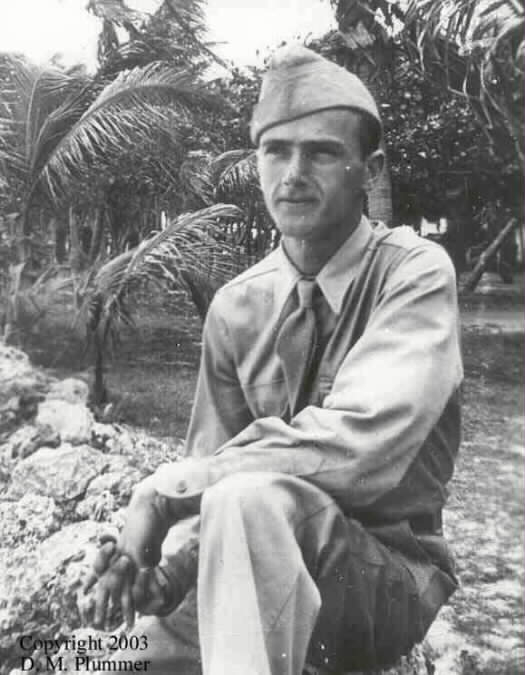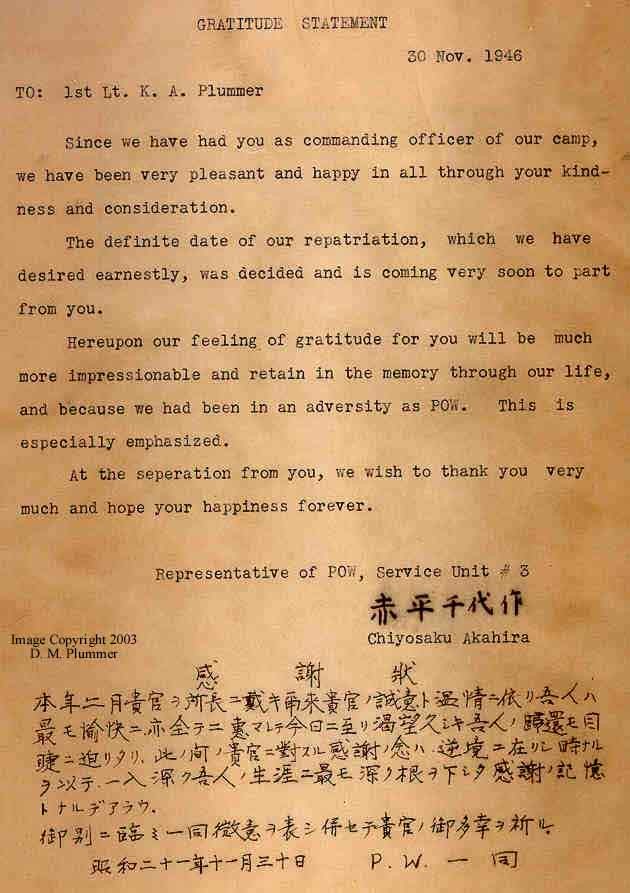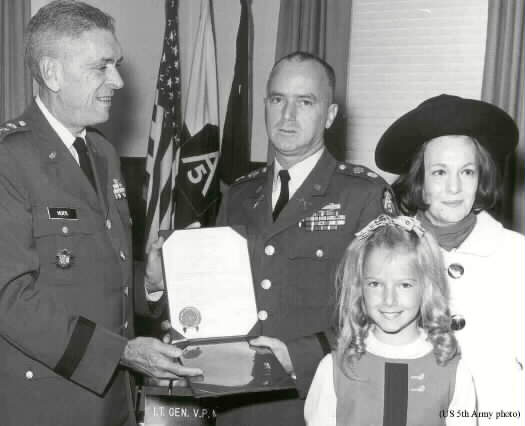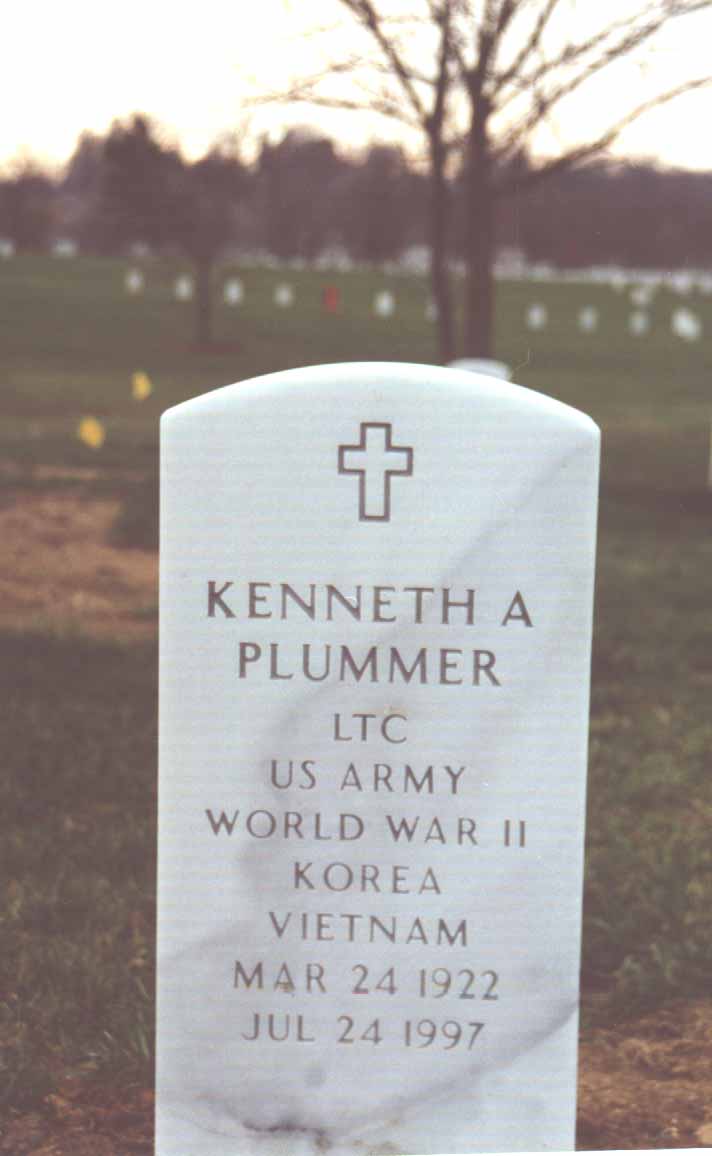Lieutenant Colonel Kenneth Alexander Plummer, United States Army (Retired)
World War II, Korea, Vietnam
Born: March 24, 1922, Chicago, Illinois
Died: July 24 1997
Buried with full military honors at ArlingtonNational Cemetery, Virginia, alongside
his wife Marie M. Plummer (nee Ricci).
by Diane Plummer
Melbourne Australia
Soldier, POW Commander, community leader, veterans advocate, businessman.
A man of action, Lieutenant Colonel Kenneth A Plummer got things done.
Patient, generous, loyal, willing to share his knowledge with others, he was at his best — and happiest — when committed to a cause. Some were private causes… others were big historic events.
As one U. S. Army General said, Ken Plummer was “an unassuming guy who was dedicated to Chicago, dedicated to veterans and who just happened to be a great organizer.” His commitment to the military and local community made him a respected, celebrated and well-liked figure in Chicago and Washington, D.C.
His organisational and logistical skills, flair for communication, persuasive intelligence, calm approach under pressure, and his ability to build alliances and manage both people and events, were assets recognised by the military and all who knew him. He applied these skills during three military conflicts: World War II, Korea, and Vietnam; as well as for good deeds in his native Chicago, and far afield in South East Asia.
Early Days & the Pacific
The eldest of five children who grew up on the south side of Chicago, Kenneth Plummer enlisted in the Army as a Private in late 1942 while still in college. After basic training he was selected for Officers Candidate School. He was commissioned an Infantry Second Lieutenant in January 1945, and then promoted to First Lieutenant.
He saw action during World War II while serving in the Philippine Islands (Luzon and Mindanao) as part of the United States Army Forces – Far East (USAFFE). He was a platoon leader, Infantry company commander and commander of Prisoner of War (POW) camp.
He was assigned to a number of units, including the 108th Infantry. This group, originally part of the 6th Army’s 40th Division, was incorporated into the 8th Army when General Robert Eichelberger made the big push to take control of the southern Philippines between February-May 1945. The largest assault took place on Mindanao.
Kamikaze Attack
In March of 1945 on a small island off Mindanao a Japanese officer and two other soldiers bearing a Japanese flag made a thwarted suicide charge against Lieutenant Ken Plummer’s platoon. The suicide mission was probably an effort to delay U. S. troops from chasing retreating Japanese soldiers who were hiding in the nearby hills. When the dust settled, Lieutenant Plummer and his men retrieved the flag. Written on it in faint letters was the dead officer’s name — Captain Giichi Kano.
Fifty years later, in 1991 on the Anniversary of Pearl Harbor, Colonel Plummer presented the flag to the Japanese Consulate General’s Office in Chicago in the hope that the flag could be returned to the Japanese officer’s family. The Japanese media called it a noble gesture.
Military Matters
In 1948, at age 26, Lieutenant Plummer separated from the Army to raise his young family in Chicago. He was re-activated to duty in the 1950s, promoted to Captain in April 1954, Major in 1961 and Lieutenant Colonel in 1966. His Army career included a long association with the U. S. Fifth Army Headquarters in Chicago with the 355th Infantry Regiment, the 322nd Logistical Command and the 366th Public Information Detachment.
Throughout these years he maintained strong bonds with the Military Order of World Wars (MOWW), the US Army Reserves, the ROTC and veterans groups. He kept on serving his nation even after retiring from active duty in 1973. He was a long-time advocate of veterans’ affairs; working hard to promote recognition for Vietnam veterans and paralyzed vets injured during all conflicts.
Even in civilian life he was active in humanitarian “mopping up” efforts involving military conflicts. In the 1970s he installed medical teams of doctors and nurses in Cambodian refugee camps on the Cambodia-Laos border for the Catholic Relief Services. No “couch potato” patriot, he was then in his mid 50s. For his contribution, especially to young people affected by the war, he received the Catholic Relief Services Award.
Colonel Ken Plummer served on the U. S. Attorney General’s Veterans Advisory Committee; was Vice Chairman of the 10-year Vietnam Veterans Parade in Chicago; Co-chair of the Gulf War’s Desert Shied and Desert Storm events for Chicago; a member of the Counsel on Foreign Relations National Strategy Forum and of the Retired Officers Association.
In 1994 he chaired the World War II 50th Anniversary D-Day Commemoration for the City of Chicago and organized the re-enactment of the Normandy Beach landing on the shores of Lake Michigan. Complete with Navy ships and paratroopers, the occasion attracted hundreds of thousands of people in celebration of the historic Allied victory. Chicago’s attendance was among the country’s largest public turnouts of civic pride in D-Day. The event prompted Mayor Richard M. Daley to recongize his efforts with a special presentation. The award sits proudly today in the home of one of his children.
Plummer was also one-time Chairman of the Oak Park Board of Health and the Oak Park Veteran’s Memorial Committee. He and his family lived in Oak Park for more than 40 years.
Awards: Giving & Getting
During his life he received numerous civic citations and military awards, including:
• Silver Star and Bronze Star
• Combat Infantry Badge
• Air Medal
• Army Commendation Medal
• Meritorious Service Award for services to the U. S. Fifth Army
• Bronze Arrowheads for amphibious landings during combat
• US Army Citation
• Reserve Officers Association Award and
• many other service and campaign ribbons
In 1992 he received Honorary Annual Membership in the Vaughan Chapter of the Paralyzed Veterans of America (PVA). He was especially dedicated to the PVA and many loyal vets attended his funeral. In 1997 his family gratefully accepted the Chapter’s PVA Lifetime Achievement Award, posthumously presented.
His unique contribution to Chicago was also recognized on his death with the Chicago City Council enacting a Resolution on September 10th, 1997 to honour his personal achievements and his generosity to the city where he was born.
In Gratitude
He once said that one of the most appreciated acknowledgments he ever received was written with an old typewriter on a single sheet of stained brown paper.
Called a “Gratitude Statement” it was presented on November 30th 1946 to First Lieutenant Kenneth Plummer by the Japanese POWs under his care in the Philippine Islands. Typed in English and also hand-written in Japanese it acknowledges his humane treatment of the prisoners.
The statement reflects a contrast in the Allies treatment of Japanese POWs to the treatment of American POWs in Japanese internment camps. Under the earlier Japanese occupation in the Philippines Islands, thousands of American and Filipino solders died during the Bataan Death March and in Japanese camps such as Cabanatuan.
Ken Plummer said it was his duty to ensure Japanese POW under his command would be treated fairly and walk away with a respect for American democracy.
In December 1946 the prisoners in his POW Service Unit #3 were repatriated to Japan. In his farewell message to them as Commanding Officer he said, quote:
“I have attempted to maintain…the highest standards of conduct, leadership and discipline…to be firm and just, kind and understanding… How well I have succeeded… can only be judged by the impressions and opinions in each of your hearts.
“If respect, admiration, and a desire for friendship towards America are implanted in your hearts and minds than I have performed my duties well… if bitterness and hate… remain, then I have failed.”
Career Moves
Colonel Kenneth A. Plummer’s military service was interspersed with a second career in the private sector. Early jobs included working with young people in the Chicago YMCA system and with Goodwill Industries, plus a stint as a Parole Officer for Illinois’ Cook County.
In the 1950s and 1960s he was Director of Public Relations and Communications with the Chicago Board of Health. Articulate and motivating, he often spoke in the media on community and public health issues.
He later operated and was President of CACOM, a cable communications business in metropolitan Chicago. In 1973 he became Communications Director of Ancilla Domini Health Services in Des Plaines, Illinois, where he worked until 1982. He also was a Board Director. In recognition of his contribution to their hospital systems he received the Ancilla Domini Award in 1980.
His final job was operating his own business in Oak Park – Great Travel Adventures, a successful tour enterprise he began in the 1980s. The immense organizational and leadership skills he learned in the Army were applied to this business, as well as to the community and humanitarian efforts in which he was always involved.
Great Travel Adventures often saw him plan overseas tours for medical and military groups. The day he died, of a cerebral haemorrhage, he was busy organising a trip for military personnel and members of the Robert McCormick-Tribune Foundation who were to attend an AMVETS Memorial Dedication at the American North African Cemetery in Carthage, Tunisia.
A Good Bloke
His Australian son-in-law, Kent Fuller, calls the Colonel “a good bloke who had immense energy and enthusiasm.”
When he wasn’t busy doing humanitarian deeds and serving his country, you might just find Colonel Ken Plummer at Al’s Grill in Oak Park.
He loved his family. Loved the camaraderie of the military. Loved his Chicago. And loved Al’s chilli burgers.
Kenneth Plummer was married in 1943 to his childhood sweetheart, Marie (nee Ricci) who predeceased him and was buried at Arlington National Cemetery in November 1996. Less than a year later he joined her.
He is survived by his children: Pamela, Diane (Kent Fuller), son Kenneth A. B. (Peggy), and Stacy (William Denne); and four grandchildren: Aria, Amanda, Allie and Madeleine.
©Copyright 2003 Diane M Plummer
Sources:
Official US Army records; Camp Stoneman Military Reservation, Separation Papers; Chicago Tribune; Chicago Sun Times; Chicago Daily News; Pioneer Press, Oak Park; Asahi Newspaper, Japan; Chicago Japanese American News; Nihon Economic News, Japan; the Council of the City of Chicago.
Lieutenant Kenneth Plummer in the Philippines, 1945
POW “Gratitude Statement,” 1946
3. Lt Col Kenneth A. Plummer accepts the Meritorious Service Award from General V.P. Mock, while wife Marie Plummer and daughter Stacy look on. (US Fifth Army photo, 1969)
Michael Robert Patterson was born in Arlington and is the son of a former officer of the US Army. So it was no wonder that sooner or later his interests drew him to American history and especially to American military history. Many of his articles can be found on renowned portals like the New York Times, Washingtonpost or Wikipedia.
Reviewed by: Michael Howard




